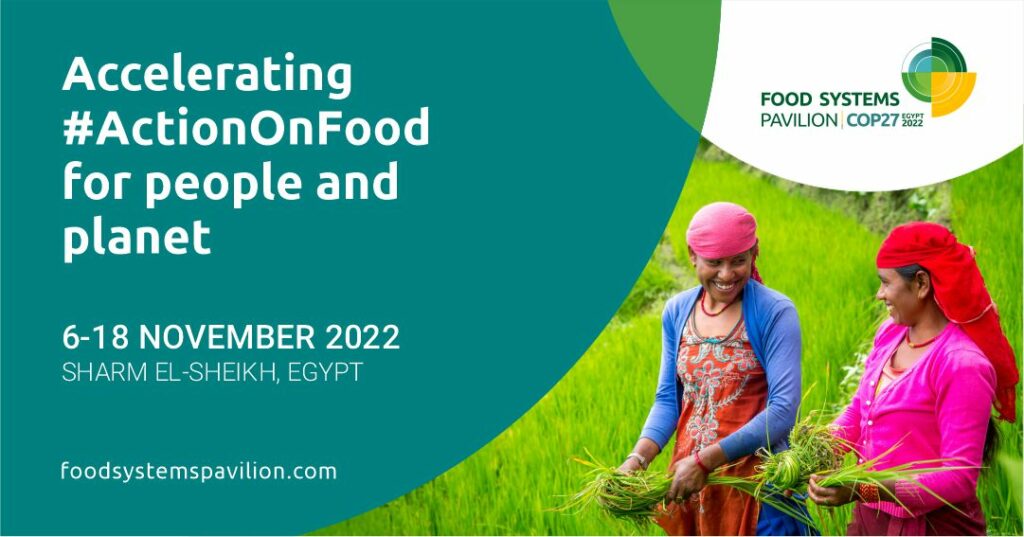GFI to bring food to the table at COP27
18 August 2022
The Good Food Institute will join 14 other organisations in co-hosting the first ever Food Systems Pavilion – set up to put food at the centre of discussions at the COP27 climate change conference.

GFI will be part of a coalition of leading international food organisations hosting the Food Systems Pavilion during the UN climate change conference COP27, held in Sharm El Sheikh in November.
Alice Ravenscroft, head of policy at the Good Food Institute Europe, said: “It’s great to finally be able to put food on the agenda at COP27, and talk to governments about how our global food system can be transformed from a cause of climate change to a solution.
“Plant-based and cultivated meat are critical to satisfying growing demand for meat with a fraction of the emissions of industrial animal agriculture. And because they require much less land, these foods can underpin global food security while creating space for nature restoration and more sustainable farming.
“I look forward to talking to policymakers at COP27 about how investing in open-access research can help achieve the enormous potential of these sustainable proteins.”
The Food Systems Pavilion brings together over 15 international leaders in the food space spanning the public, private and not-for-profit sectors, from farmers and youth to policymakers and scientists. This diversity of expertise and perspectives sets it apart from other coalitions, with co-hosts and partners committing to work collaboratively to tackle trade-offs, showcase solutions and overcome barriers.
Other participating organisations include co-hosts Clim-Eat, Coalition of Action for Soil Health (CA4SH), EIT Food, Environmental Defense Fund, FOLU, Infarm, SNV and Yara International; session partners Aleph Farms, Food Tank, Just Rural Transition, One Acre Fund and Rabobank; and supporting partners World Farmers’ Organisation, World Food Forum, YPARD, IAAS World and YOUNGO.
Dr Dhanush Dinesh, Clim-Eat founder, commented: “New visions are needed for how food systems will operate in the future, and the central role of farmers and small-scale agriculture as positive agents of change. Business as usual is not an option.
“To address these issues publicly and collaboratively, we are bringing together farmers, food producers, NGOs, businesses, youth, indigenous peoples, governments and intergovernmental organisations in the first ever Food Systems Pavilion.
“We believe COP27 will represent a critical turning point for our food systems. We urge all interested parties to join us in championing #ActionOnFood and making this the food COP.”
With agriculture and food systems contributing over one-third of greenhouse gas emissions, there are many complex challenges to overcome, but also huge opportunities. Transforming the world’s food systems could generate €4.4 trillion annually in new economic activity and help to create a net-zero, nature-positive world, while also ensuring social justice and food security.
At COP26 in Glasgow, food and agriculture were largely absent from the discussions. At COP27, the Food Systems Pavilion co-hosts want to substantially put food centre stage.
Dr Agnes Kalibata, President of the Alliance for a Green Revolution in Africa (AGRA), UN Secretary-General’s Special Envoy to the 2021 Food Systems Summit and FOLU Ambassador, said: “We must ensure that food dominates the COP27 agenda. It has been the missing piece in climate negotiations for far too long. Yet, Africa is putting huge bets on a COP on the continent. We hope that the world recognises that our ability to produce food is fast being eroded, our adaptation capacity is the weakest, and how food is produced in parts of the world creates problems we must address.
“Transforming our food systems unlocks opportunities to significantly reduce GHG emissions, mitigate the impacts of climate change, and provide solutions to some of the most pressing environmental and social issues of our time.
“Without urgent action on climate change, an additional 100 million people in Africa could be pulled into extreme poverty in the next eight seasons – that’s more than 10 million people every year between now and 2030 – people that have until now been feeding themselves! Timely action on food systems is essential to stop more people from sliding into poverty and food insecurity – it is good for both people and the planet.”
The Food Systems Pavilion will focus on actions, strategies and solutions spanning the entire food value chain which offer the potential to accelerate the transition to healthy, sustainable and equitable food systems for all.
To find out more about the Food Systems Pavilion and its programme of events, visit FoodSystemsPavilion.com or search the hashtag #ActionOnFood on social media.
